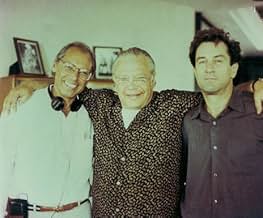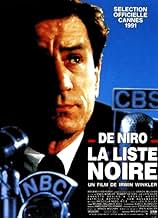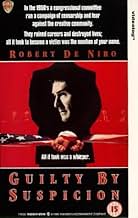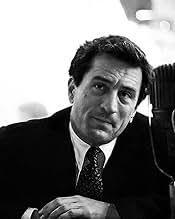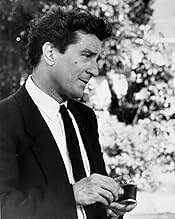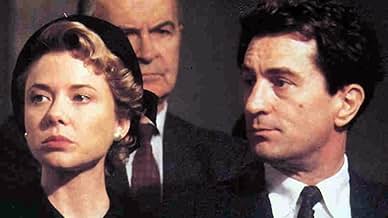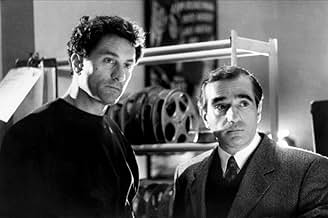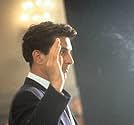AVALIAÇÃO DA IMDb
6,5/10
10 mil
SUA AVALIAÇÃO
Retornando a Hollywood em 1951, depois de trabalhar na França, um diretor de cinema enfrenta o macartismo de frente.Retornando a Hollywood em 1951, depois de trabalhar na França, um diretor de cinema enfrenta o macartismo de frente.Retornando a Hollywood em 1951, depois de trabalhar na França, um diretor de cinema enfrenta o macartismo de frente.
- Prêmios
- 2 vitórias e 2 indicações no total
Roxann Dawson
- Felicia Barron
- (as Roxann Biggs)
Avaliações em destaque
It's almost impossible to write any kind of objective film about the blacklist, the wounds of it run deep in show business. Guilty By Suspicion has no pretense to objectivity, neither does that John Wayne epic Big Jim McLain which was favorable to the House Un American Activities Committee.
Those who gave testimony at HUAC did so for a variety of motives. Some like Adolphe Menjou wanted the blacklist for everyone to the left of Herbert Hoover. Some like Robert Taylor felt they were doing a patriotic service. Some under the threat of not being able to work as artists in their chosen profession named names before HUAC. A very select few said stick it in your ear.
If there any guilty parties it's not the artists whatever their political persuasion. It was the studio bosses and one of them, Darryl F. Zanuck is played here by Ben Piazza, who gave in without exception to HUAC and cooperated in the blacklist, who pitted the people of various political persuasions against each other. Sad to say that's not really demonstrated here in Guilty By Suspicion.
The members of HUAC were 95% on the political right of both parties. The Democrats were mostly southerners and the Republicans were on the right in their party. The liberals of either party had more constructive ways to spend their time in Congess.
Guilty By Suspicion tells the story of Robert DeNiro as a fictional film director who gets blacklisted because of secret hearing testimony given by Chris Cooper. His struggle to find work turns positively Kafkaesque until he agrees to go before the committee.
DeNiro strikes all the right notes in his performance and is aided and abetted by the performance of Annette Bening as his estranged wife. Acting honors however go to Patricia Wettig who plays a distraught blacklisted actress with a drinking problem to start with.
Guilty By Suspicion is not the ultimate telling of the blacklist's story, but it's still pretty good and does get a feel for the times the story is set in.
Those who gave testimony at HUAC did so for a variety of motives. Some like Adolphe Menjou wanted the blacklist for everyone to the left of Herbert Hoover. Some like Robert Taylor felt they were doing a patriotic service. Some under the threat of not being able to work as artists in their chosen profession named names before HUAC. A very select few said stick it in your ear.
If there any guilty parties it's not the artists whatever their political persuasion. It was the studio bosses and one of them, Darryl F. Zanuck is played here by Ben Piazza, who gave in without exception to HUAC and cooperated in the blacklist, who pitted the people of various political persuasions against each other. Sad to say that's not really demonstrated here in Guilty By Suspicion.
The members of HUAC were 95% on the political right of both parties. The Democrats were mostly southerners and the Republicans were on the right in their party. The liberals of either party had more constructive ways to spend their time in Congess.
Guilty By Suspicion tells the story of Robert DeNiro as a fictional film director who gets blacklisted because of secret hearing testimony given by Chris Cooper. His struggle to find work turns positively Kafkaesque until he agrees to go before the committee.
DeNiro strikes all the right notes in his performance and is aided and abetted by the performance of Annette Bening as his estranged wife. Acting honors however go to Patricia Wettig who plays a distraught blacklisted actress with a drinking problem to start with.
Guilty By Suspicion is not the ultimate telling of the blacklist's story, but it's still pretty good and does get a feel for the times the story is set in.
I consider this period of the early 90's to be Robert DeNiro's second wind, if you will, after many great films he starred in the 70's. This film, along with the excellent Goodfellas, Awakenings, Night and the City, A Bronx Tale, and Cape Fear highlighted a great actor's resume. He hasn't done many great films in a while, but his acting chops speak for themselves. He stars here as David Merrill, a blacklisted director in Hollyweird, who's basically accused of being a communist and certain government factions want him to name names. His performance, although subdued, is very solid as he struggles with the decision to either report his friends, who are thought to be Communist in order to rescue his once promising career, or refuse to give up any names so their lives and careers won't be destroyed also. There's a moving scene between Merrill and congress as they bombard him with questions and accusations. This is probably the most memorable scene, but I thought it tries to wrap the film up in a neat little ball, as opposed to letting us know exactly what went on in those supposedly communist meetings Merrill was a part of, and what was discussed there and who attended these meetings.
George Wendt does a commendable job as Bunny Baxter, even though it's difficult to see him other than Norm from Cheers, but I digress. Annette Benning and Patricia Wettig also give solid performances in this forgotten little film based on a true story.
George Wendt does a commendable job as Bunny Baxter, even though it's difficult to see him other than Norm from Cheers, but I digress. Annette Benning and Patricia Wettig also give solid performances in this forgotten little film based on a true story.
The merit of this film is that it portrays the mechanism, the mentality and the impact on human character of what might very well be any communist regime there ever was in a stunningly perfect way (as a person grown up in a socialist country, believe me - I know!) - only here represented by people who are supposed to prevent communism from spreading! A great comment on human nature - whether intended or not is less important. If I didn't know better, I'd believe this was a Hollywood remake of some film about Stalin's 30:s purges or Polish repressions against the right wing combatants in the 50:s. Solid performance from De Niro, supported by a talented cast. Martin Scorsese appears in a cameo that must be one of the most extensive in his acting career.
In 1947 the House Committee on Un-American Activities began an investigation into Communism in Hollywood. Shortly after this director David Merrill returns from filming abroad. It is not long before he is targeted for having attended "a few meetings" a few years ago. The approach is softly, softly with the committee just wanting Merrill to name some more names for them. When he refuses to help, he finds himself gradually cut out of studios and projects, with fewer and fewer people willing to take his calls.
The period of history around which this film is set is an interesting one and one that is worth knowing about as part of the whole "learning from history" ideal. However this is not the same as the film itself being good because unfortunately it is not what I would have liked. It relies too heavily on the informative nature of the recreation of the period rather than developing an interesting script with realistic characters. It doesn't help that the film tries to be all very serious and respectful but does rather fail and ends up coming over all earnest and self important. The script also tries not to really upset anyone who didn't take the moral stance of the fictional Merrill by just focusing on him even though it would have been a lot more interesting if it had had outrage, bitterness and realism at its heart.
Winkler directs without a great deal of style and his courtroom scene is average where it should have been the best scene of the film. De Niro works his material hard and makes for an engaging lead, however it is the lack of depth and complexity in his material that limits his performance. This is more or less true of the rest of the cast which, although starry, doesn't really provide anyone in particular with an opportunity to mark themselves out. Bening, Wendt, Wettig, Wanamaker, Sizemore, Scorsese, Cooper and others are good presences but not much more than that.
Overall then an interesting film in so much as it informs about an important period of history. However it is all very earnest and safe and lost a lot of potential for me. The cast is starry but the material is middle-of-the-road and didn't give anyone the complexity and outrage that the subject deserved.
The period of history around which this film is set is an interesting one and one that is worth knowing about as part of the whole "learning from history" ideal. However this is not the same as the film itself being good because unfortunately it is not what I would have liked. It relies too heavily on the informative nature of the recreation of the period rather than developing an interesting script with realistic characters. It doesn't help that the film tries to be all very serious and respectful but does rather fail and ends up coming over all earnest and self important. The script also tries not to really upset anyone who didn't take the moral stance of the fictional Merrill by just focusing on him even though it would have been a lot more interesting if it had had outrage, bitterness and realism at its heart.
Winkler directs without a great deal of style and his courtroom scene is average where it should have been the best scene of the film. De Niro works his material hard and makes for an engaging lead, however it is the lack of depth and complexity in his material that limits his performance. This is more or less true of the rest of the cast which, although starry, doesn't really provide anyone in particular with an opportunity to mark themselves out. Bening, Wendt, Wettig, Wanamaker, Sizemore, Scorsese, Cooper and others are good presences but not much more than that.
Overall then an interesting film in so much as it informs about an important period of history. However it is all very earnest and safe and lost a lot of potential for me. The cast is starry but the material is middle-of-the-road and didn't give anyone the complexity and outrage that the subject deserved.
Some Americans today may never have heard of Senator Joseph McCarthy and McCarthyism. McCarthyism is the practice of making accusations of subversion or treason without proper regard for evidence. The term refers to U.S. senator Joseph McCarthy (R-Wisconsin) and has its origins in the period in the United States known as the Second Red Scare, lasting from the late 1940s through the 1950s. It was characterized by heightened political repression and a campaign spreading fear of communist influence on American institutions and of espionage by Soviet agents. After the mid-1950s, McCarthyism began to decline, mainly due to the gradual loss of public popularity and opposition from the U.S. Supreme Court led by Chief Justice Earl Warren. The Warren Court made a series of rulings that helped bring an end to McCarthyism.
The movie "Guilty by Suspicion" takes place in Hollywood during the height of the Second Red Scare. The movie focuses on David Merrill (Robert De Niro) though he is indicative of many Hollywood personnel affected by the Communist witch hunting.
David, by all indications, was a gainfully employed movie director that was in constant demand. He would have been able to stay gainfully employed so long as he told the F.B.I. what they wanted to hear. And they wanted to hear that certain friends of David's were Communists. David, valuing friendship over finances, opted to keep quiet about any of his friends activities. For that, David was put on the Hollywood blacklist.
"Guilty by Suspicion" is a weighty movie. We get an up close and personal look at what McCarthyism was doing to people's lives. Now I know that some of you may be saying, "Who cares? It was Hollywood." To that I would say that the Constitution never put zoning restrictions on who it applied to. The Constitution didn't have a Hollywood exemption in it and the U.S. government was trampling all over people's Constitutional rights. If they didn't have enemies within the U.S. they were certainly making them.
The movie "Guilty by Suspicion" takes place in Hollywood during the height of the Second Red Scare. The movie focuses on David Merrill (Robert De Niro) though he is indicative of many Hollywood personnel affected by the Communist witch hunting.
David, by all indications, was a gainfully employed movie director that was in constant demand. He would have been able to stay gainfully employed so long as he told the F.B.I. what they wanted to hear. And they wanted to hear that certain friends of David's were Communists. David, valuing friendship over finances, opted to keep quiet about any of his friends activities. For that, David was put on the Hollywood blacklist.
"Guilty by Suspicion" is a weighty movie. We get an up close and personal look at what McCarthyism was doing to people's lives. Now I know that some of you may be saying, "Who cares? It was Hollywood." To that I would say that the Constitution never put zoning restrictions on who it applied to. The Constitution didn't have a Hollywood exemption in it and the U.S. government was trampling all over people's Constitutional rights. If they didn't have enemies within the U.S. they were certainly making them.
Você sabia?
- CuriosidadesMartin Scorsese portrays a fictional director called "Joe Lesser". This character is based on director Joseph Losey, who left Hollywood in the 1950s rather than face the HUAC examinations.
- Erros de gravaçãoThere is a Milwaukee Braves baseball pennant on the wall of Merrill's son's room. This film takes place in 1951 and 1952. The Braves didn't move to Milwaukee from Boston until 1953.
- Citações
David Merrill: [to the Blacklist Committee] Fuck them!
- Trilhas sonorasStraighten Up and Fly Right
Written by Nat 'King' Cole and Irving Mills
Performed by Nat 'King' Cole
Courtesy of Capitol Records, Inc.
By arrangement with CEMA Special Markets
Principais escolhas
Faça login para avaliar e ver a lista de recomendações personalizadas
- How long is Guilty by Suspicion?Fornecido pela Alexa
Detalhes
- Data de lançamento
- País de origem
- Idioma
- Também conhecido como
- Culpable por sospecha
- Locações de filme
- Empresas de produção
- Consulte mais créditos da empresa na IMDbPro
Bilheteria
- Orçamento
- US$ 13.000.000 (estimativa)
- Faturamento bruto nos EUA e Canadá
- US$ 9.480.198
- Fim de semana de estreia nos EUA e Canadá
- US$ 2.278.290
- 17 de mar. de 1991
- Faturamento bruto mundial
- US$ 9.480.198
- Tempo de duração
- 1 h 45 min(105 min)
- Cor
- Mixagem de som
- Proporção
- 1.85 : 1
Contribua para esta página
Sugerir uma alteração ou adicionar conteúdo ausente


